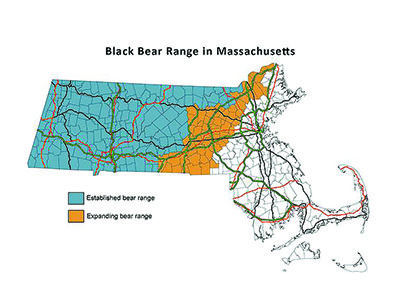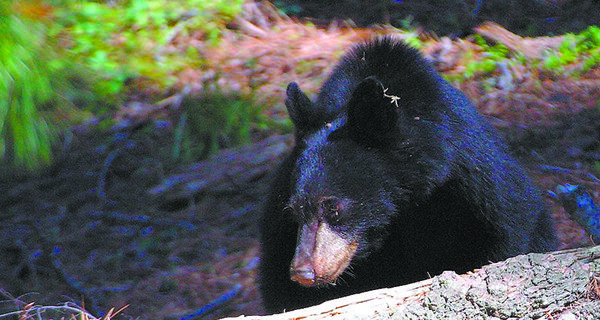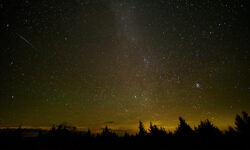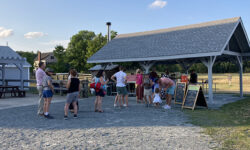[ccfic caption-text format="plaintext"]
By Lisa Moore
Hometown Weekly Correspondent
The black bear, ursus americanus, is the only species of bear that lives is Massachusetts, and ranks as the largest meat-eating mammal in the state. With several recent sightings in Framingham, Wrentham and Newton, knowing how to safely coexist with this important species can keep both humans and bear safe.
This large animal has black fur overall with a brown muzzle. It will occasionally have a white patch on its chest. Male black bears are called boars and range between 150-450 lbs. while females, called sows, range between 100-300 pounds. Bears have excellent hearing and eyesight, an extraordinary sense of smell, can run at 35 MPH, climb trees as fast as a squirrel, and are excellent swimmers.
This large, strong, and fascinating wild animal lives for approximately 25 years in the wild, with the largest reaching weights near 500 lbs. For such an imposing figure, black bears are normally elusive, solitary creatures, only exhibiting aggressive and predatory behavior on rare occasions, especially if they feel threatened or if there is a perceived threat to a mother with cubs.
Black bears mate in mid-June through mid-July. Sows reach sexual maturity between the ages of 3-5 and will breed every other year, having one of the lowest reproductive rates of any North American mammal. Shortly after the sow mates and her eggs are fertilized, cell division in the embryos will stop and there will be delayed implantation. In the fall, the small balls of cells will attach to the wall of her uterus and resume development. Six to eight weeks after implantation, in January or February, her cubs will be born while she dens. They will emerge in early March or April, depending on food availability. Females will have litters of 2-3 cubs, weighing about a half pound each. They will feed on mother’s milk until they leave the den for the first time. The cubs will remain with her for up to 17 months.
Bears will enter hibernation, a state in which their bodily functions decrease or stop. It is an adaptation that allows the bear to survive the long winter months, where food sources are scarce. During hibernation, the bear will go into a deep sleep, spending the cold winter months in a den. They enter the den in November or December, when the local food sources are depleted. As they sleep, their body temperature will drop from approximately 100 degrees to 88 degrees and their heart rates will drop from about 50 beats per minute to about 8 beats per minute. Because the bear's temperature stays relatively warm, it can respond to danger faster than a deep hibernator can. For approximately 100 days, the bears will sleep - they won’t eat, drink, urinate, or defecate. Bears have a unique ability: their bodies break down urea in waste and turn it into protein, decreasing muscle loss during hibernation. They are able to survive on the stored fat, about 3-4 inches, that they put on in spring, summer, and fall. Bears will lose about 30 percent of their body weight during hibernation and rely on their thick fur, which doubles in insulation value in the fall, to keep them warm through hibernation.
Bears are most active during the day, especially around dawn and dusk. They will travel more in summer, especially breeding males, who will travel great distances in search of a mate. They become less active in fall, staying near good food sources and conserving energy for the winter hibernation. Bears will den when food becomes scarce, males entering first and females with cubs entering later. They like to den in caves or rock outcrops, and under fallen trees or brush piles.
Historically, black bears have inhabited every province and territory in Canada, all of the continental US states, and the northern states of Mexico. Since the 1970s, there has been an increase in number and distribution of black bears. Massachusetts is the third most densely populated state in the country. As the human population increases in the state and urban sprawl continues to remove natural bear habitats, human and bear encounters will become more numerous. Currently, the state population of black bear is estimated to be over 4,500 animals, with the majority living and breeding in Worcester County, Middlesex County, and west to the Berkshires. As habitat destruction increases competition, bears are expanding their territory in search of other sources of food and space.

The range of the black bear in Massachusetts is moving steadily eastward. Photo courtesy of Mass Division of Fisheries and Wildlife.
Bears occupy a wide range - approximately 120 square miles for males and about 11 square miles for females. They are extremely intelligent animals that remember where there are reliable sources of food, and revisit those areas often. Omnivores, bears eat both plants and animals. In the spring, they will eat the lush emerging plants near wetlands, in the summer they search for berries, grasses, sedges, and tubers. As summer turns to fall, bears will eat oak acorns, beechnuts and hickory nuts, and throughout the seasons, they will eat grubs, insects, frogs, snakes, fish, bee larvae, birds, dead animals, and occasionally take a young deer. Black bears are also opportunistic and will feed at bird feeders, visit farmland to eat corn, visit orchards to feed on fruit, and visit beehives for honey. Bears have also learned to visit trash bins in residential areas to find food.
Basically, bears will go wherever there is food, and the risk to both human and bear safety increases when bears find reliable food sources near humans and become habituated - they get used to seeing people, and lose their fear of humans. Preventing black bear habituation can be done in suburban areas by decreasing potential feeding grounds for bears. This includes removing bird feeders and beehives from residential areas, keeping trash secured, bringing in small pets and not leaving pet food out, removing brush piles or fallen trees where bears might like to den, and maintaining natural spaces to prevent wildlife encroachment.
While bear encounters are rare, knowing how to watch for bear behavior signs and some general do’s and don’ts can help to keep both bear and human safe. The Massachusetts Division of Fisheries and Wildlife offers a number of suggestions. If you see a bear in your town, its mere presence is not a threat to public safety and in most cases, it will move off on its own if left alone. Be sure to keep dogs leashed and away from the bear and avoid having a large gathering of people near the bear; this will stress it and increase the risk of aggressive behavior, or cause the bear to run off into traffic or into a group of bystanders. It is important not block the free passage of the bear, and to insure it has an escape route. If the bear is near your residence, make noise, clap, and talk, all while backing away. Never feed bears or get between a mother bear and her cubs. Once the bear leaves the area, remove the attractant. In suburban areas if you see a bear, or if one has become a public nuisance, residents should contact the Massachusetts Environmental Police at (1-800-632-8075) or nearest MassWildlife District office. They can give advice, and determine if a large animal response team (LART) is necessary. LART officers are trained to tranquilize the animal, assist on the scene, and coordinate with local officials to ensure safety of the public and the animal.
In the woods, bears are usually wary of people. The trail noise a person makes as they walk through the woods usually alerts a bear to their presence, and often a bear will disappear before being seen. If you see one on a trail, make noise and back away. A bear might not recognize a person as human until it smells you. Do not run, do not climb a tree, do not go into a body of water - make noise and back away. In the very rare case that a black bear attacks, stand your ground, be loud, and fight back immediately.
Black bear are regulated as a game species in Massachusetts, hunted by limited permit during a limited legal open season. Trapping black bear is illegal in the Commonwealth.
Prevention is the best method for limiting bear contact with people. Black bears' natural instinct is to search for enough food to enable it to form a nice fat layer and survive hibernation. If attractants such as bird feeders, beehives, pet food, and garbage are made inaccessible to bears, they will move on to places where food is available.
Maintaining a viable bear population is important. They are an indicator species that tell us of the overall health of the environment. Bears make up an important part of a healthy ecosystem. They are a native species to Massachusetts and a part of our natural heritage. Prior to 1952, black bear could be hunted at any time by anyone. This lack of oversight, plus loss of habitat, significantly decreased black bear populations in the state. With current regulations on black bear hunting, the population has slowly rebounded and is growing slowly.























